 |
| |
| |
|
Strategies and ideas for life and business, to help you maximize results!
|
| |
|
You're receiving this complimentary e-letter, either because you requested a free subscription or because of our relationship with you, your company or your association.
TOO TINY? NO WORRIES!
If you're reading The Results Report on your desktop, initially your browser or operating system might make it tough on your eyes, as the page or font appears small. No worries! Simply hold down your Windows Key or Apple Command Key and at the same time hit your + key. Each time you do this, it'll enlarge the type or page. It's that easy! Now you'll have a bigger and better Results Report reading experience. (To decrease the size, hold down your command key, while also hitting your – key.) Here's to your results!
|
| |
|
POWERQUOTES
|
| |
“The secret of change is to focus all your energy not on fighting the old but on building the new.”
- Socrates, a founder of Western philosophy
“The value of an idea lies in the using of it.”
- Thomas Edison, inventor and co-founder of General Electric
“Wonder what your customer really wants? Ask. Don't tell.”
- Lisa Stone, co-founder of BlogHer
“Despite popular belief, business development isn't characterized by manipulation, mind-reading, mysticism, magic or mystery. It requires hard work, a sustained effort and the sincere desire to help others.”
“Successful businesspeople aren't born. They're nurtured, developed and trained. At least the top achievers are.”
“Questions help establish rapport, uncover concerns, reveal problems and peak profits. Questions are a natural way to get others to talk, so you can listen and learn!”
The preceding three quotes, are excerpts from the new 5th edition of my bestselling, Peak Your Profits. Available on Amazon at:
BlackmanPeakYourProfits5
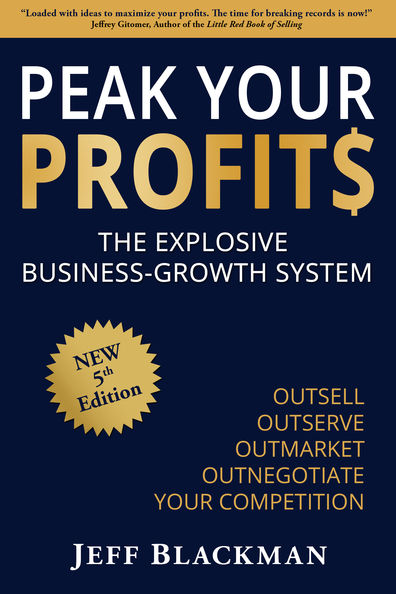
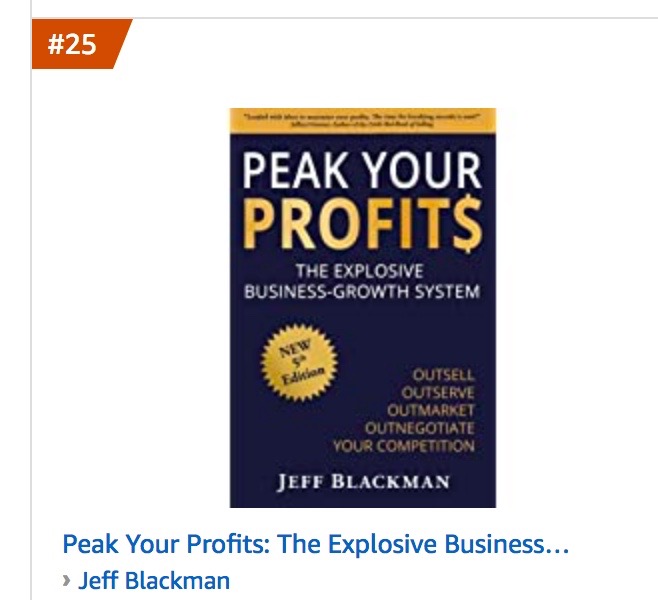
And thanks to all of you, who helped PYP5 jump to #25 on Amazon.
|
|
JEFF, SO WHATTA YA THINK?
|
| |
QUESTION: Jeff, have heard you speak more than once, and been a Results Report subscriber for years—and always like when you share things you've learned from clients. What's a recent memorable experience?
ANSWER: What a terrific question. In May, preparing for a results-session I'd be leading in June, I had a Zoom call with Race, a client's successful sales pro.
One of the things we discussed, is a topic, we too have addressed—and that's the importance and significance of preparation.
Race shared an interesting story, about his achievements as a high school wrestler. Plus, the advice his grandfather had given him as a freshman grappler. Which, over time, Race learned was applicable to wrestling, life and business.
His grandfather said, "There are two pains you can face. The pain of discipline. And the pain of regret."
That simple message, always inspired Race to be "ready". To compete. To win.
I then shared with Race, that I too wrestled—in grammar school. And discovered valuable lessons from wrestling—that were especially confirmed and reinforced decades later as a parent, while in our local high school.
I then turned those winning ways, into a very popular back-issue newspaper column.
Hope you find it as valuable as Race and others have.
• • • • •
CRAZY COMPETITORS & WRESTLING'S WINNING WAYS!
If you play the "game of business" long enough, you'll be blessed with worthy opponents. They're honest. Smart. Aggressive. Innovative. And customer-focused.
They actually force you to get better. Because if you don't, you'll quickly become a business casualty.
However, all competitors are not created equal.
As a client of mine once declared, "I've gotta be smarter, than my dumbest competitor!"
Therefore, on occasion, your competitors will make stupid decisions. Remember, that's their choice, not yours. You can only control, that which you can control. You can either be pro-active to your marketplace, competition, prospects and customers or re-active.
Re-active is also a choice. Yet the key, is how you react.
 When I was in grammar school, I wrestled. And I always remember my coach stressing, "For every move your opponent makes, you have at least one countermove." His point, despite the immediate obstacle or momentary setback, you can "escape" harm or "create" positive leverage with your next decision or action. When I was in grammar school, I wrestled. And I always remember my coach stressing, "For every move your opponent makes, you have at least one countermove." His point, despite the immediate obstacle or momentary setback, you can "escape" harm or "create" positive leverage with your next decision or action.
In business and life, that decision can necessitate action that's swift and bold. Or, when appropriate, silence or a totally different course or pursuit produces the right results.
When clients have sought my counsel on how to "react" to a competitor's promotion, pricing strategy or other business issues, I've often replied, "You don't."
Instead, I urge them to focus on innovation vs. imitation. Dynamic creation vs. knee-jerk reaction. This, enables them to focus on the right results and positive outcomes they help others attain.
To devote too much time to how you "whup competitors" or "respond" to their decisions is a physical, emotional and financial drain of energy and resources.
Yet, when necessary, here are some interesting suggestions for "defeating opponents." And they come from a totally unexpected source.
With three kids, two of whom are graduates of Glenbrook South High School, and one who is currently a junior, over the years, we've spent lots of time at GBS for sporting events, concerts, dance competitions, plays, variety shows and volunteer activities.
One of the things I enjoy doing while at school, is wandering the halls. There's always cool stuff hanging on the walls and windows; artwork, quotes, newspaper headlines, magazine stories, etc.
I spotted the following tips, on a training room bulletin board. They're excerpts from WIN Magazine, a publication dedicated to amateur wrestling. While they were written for the benefit of the high school wrestler who is eyeball-to-eyeball with an opponent on the mat, you'll see their immediate adaptation and application to your life and business:
- nothing your opponent can do to you, will take you out of your intense, focused game plan
- nothing will phase you, nothing will bother you
- nothing will derail your tenacious, relentless attack
- breaking your opponent is not about causing an injury, it's about your will to "fight," to concentrate, to be confident (all of which, are escalating), while your
opponent's are declining 
- your desire, causes your opponent to have self-doubt; mentally, physically and emotionally
- your will to win, produces negative thoughts in your opponent, they begin to wonder about themselves, "Am I too tired?" or "Am I overmatched?"
- and they ask if you are, "Too tough. Too determined. And too good!"
BONUS VIDEO CONTENT
THE VINe PHILOSOPHY!
In this brief interview excerpt, you'll learn the importance of being; value-driven, integrity-based and non-manipulative. And how they dramatically influence and drive—your significant results and rewards.
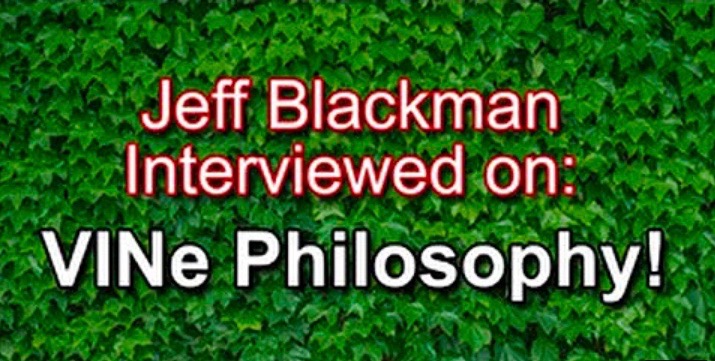
BlackmanVINePhilosophy video: (2:30)
|
| |
|
INVISIBLE! INVALUABLE!
|
| |
|
Every day, if you're confronted by obstacles, problems or challenges—consider yourself blessed. Because they give you opportunities to creatively seek solutions. Ponder possibilities. Ask questions. Foster experimentation.
And if there's one person, who can be a valuable guide on this innovative, problem-solving journey, it's my friend Stephen Shapiro. For decades, his transformative thinking and counsel, have been helping companies thrive.
Stephen has combined his engineering degree from Cornell, fifteen years at Accenture and entrepreneurial experience as a fellow Hall of Fame speaker and bestselling author—to enable others to optimize innovation results and ROI.
Jeff Blackman: In your sixth book, Invisible Solutions, you feature a quote by Mark Twain, "There is no such thing as a new idea." What's your perspective on Twain's claim?
Stephen Shapiro: In the innovation community, this is a heated debate. Some claim there are new ideas. From my perspective, nearly every new idea was built on a previous idea or is a combination of multiple existing ideas.
 Penicillin, a 20th century discovery, has roots going back 5,000 years to Mesopotamia, Ancient Egypt, India, and China—when fungi and other plants were used to treat diseases. We can go back further to the Paleolithic, 60,000 years ago—when, according to archeologists, plants were used as medicine. Innovators, instead of worrying about novelty, should focus on value. The problem, the innovation solves. Penicillin, a 20th century discovery, has roots going back 5,000 years to Mesopotamia, Ancient Egypt, India, and China—when fungi and other plants were used to treat diseases. We can go back further to the Paleolithic, 60,000 years ago—when, according to archeologists, plants were used as medicine. Innovators, instead of worrying about novelty, should focus on value. The problem, the innovation solves.
JB: How does an individual or company, make the creative process more efficient, valuable and profitable?
SS: It's important to distinguish innovation from creativity. Creativity is the spark or inspiration that generates an idea. Innovation is about finding an important problem and solving it. For greater efficiency, it needs to be a process—that doesn't start with an idea, but a well-framed, important problem or opportunity. This focuses energies on what matters most. Compare this to suggestion-boxes where hundreds of ideas are submitted, yet few are of value.
JB: We're both ardent believers in the importance of questions. Yet, why are they so important to innovation or breakthroughs?
SS: Changing one word in a problem-statement can significantly impact the range of solutions. Customers, revenue, sales, and profits are similar words, but each will yield different solutions, if you solve for it. For example, let's examine the woes of airport baggage-claim. One opportunity, is to REDUCE wait time. That's ideal. But when you can't reduce it, maybe you IMPROVE the wait time. A one-word change creates different solutions. Here, it may even lead to new places for solutions. Who are the "wait" experience experts? Theme parks, like Disney World and Universal Studios.
JB: How do you assure, the right questions are asked?
SS: There aren't right or wrong questions. All questions lead to results and solutions—they're just different. What matters, is getting people inside an organization to understand and value the impact of questions. The leader's role isn't to have the answers. It's to ask better questions, that get the entire organization to ask better questions. This taps into the team's collective wisdom. When everyone challenges assumptions and the status quo, you have better chances of being relevant.
JB: You say, the least understood step of problem-solving and innovation is "problem-definition"—meaning…?
SS: We're wired to find solutions. But having all the answers, isn't the answer. A key principle in design-thinking and innovation is, "Don't fall in love with the solution; fall in love with the problem." But this isn't natural. We assume the problem to solve, is the one in front of us. Yet that's often not the case. A fortune cookie I once received, said it well, "You always have the right answers. They just sometimes answer the wrong questions."
JB: Why is, "Don’t bring me problems, bring me solutions."—terrible advice?
SS: Leaders don't need more ideas, solutions or low-value suggestions. They need better, meatier, well-framed challenges. By finding better questions/problems/opportunities—an organization can make a more substantial impact to the bottom-line. Einstein reputedly said, "If I had an hour to save the world, I'd spend 59 minutes defining the problem and one minute finding solutions." Most organizations spend 60 minutes solving unimportant problems, or they're not framed in a way that'll reveal hidden solutions.
JB: What impact will Artificial Intelligence have, on our ability to solve problems or create unique solutions?
SS: The World Economic Forum in their past five-year forecasts, stated "complex problem solving" is the most important soft skill for individuals and organizations to develop. According to their research, AI can do a lot, but it's (currently) limited in its ability to make certain connections. The report notes, "It's true AI can solve problems humans can't—but it also goes the other way. When problem-solving needs to span multiple industries or when problems aren't fully defined, humans can work backwards to figure out a solution." This is a great perspective. AI is a very powerful tool. But you need to focus it on the right problem. I'd argue complex problem-formulation is even more important. We don't yet have technology that can do that.
JB: You claim, "People don't want creativity!"
SS: People SAY they want creativity or innovation, but at a deep level, they don't. A recent Cornell University study showed, although leaders verbally said they wanted change, when they tested their true subconscious beliefs, researchers found they didn't really want it. Change and creativity were highly correlated with agony and pain. Why? Researchers found novelty is often viewed as being antithetical to practicality. Practicality equals value. Newness, carries subconscious implications of uncertainty, which endangers survival. This creates tension. So one chooses the safe solution, over riskier, more creative ones.
JB: In Invisible Solutions you identify 25 lenses for reframing problems. For simplicity, what's a lens? 
SS: It's a different way of looking at a problem. Just like when you go to an optometrist and they use different lenses to help you see more clearly. The book's 25 lenses do the same. They help you reveal hidden solutions, maybe in front of your nose, but you can't see them. Lenses challenge your assumptions.
JB: You urge folks, to not think outside the box, instead—find a better box…
SS: It's the Goldilocks Principle. Sometimes we ask questions that are too soft, (broad/abstract). And sometimes we ask them in a way that's too hard, (narrow/specific). We want to ask questions—just right. Thinking outside the box implies broad questions yield better solutions. That's rare. You might get more solutions, but they'll be of lower value. To find a better box, reframe the problem to the right level of abstraction—so you can find better solutions.
JB: Please define your FAST innovation process, and what makes it so powerful...
SS: There are four steps that drive the FAST Innovation process: FOCUS. ASK. SHIFT. TEST. It's powerful, because you get a tenfold improvement on innovation ROI.
FOCUS means "innovate where you differentiate." Invest in the areas of your business that have the greatest impact.
ASK means ask better questions. It's the problem-formulation step.
SHIFT is the solution-finding step. Expertise is the enemy of innovation. Therefore, to find breakthroughs, shift your mindset. Plus look outside your industry or area of expertise for solutions.
TEST is built on the belief—you don't want to fail, but instead experiment. When done correctly, experimentation massively reduces your risk of failure.
JB: How does any size company identify their "true" differentiators?
SS: There are five Ds of differentiation:
1) Your differentiator must be distinctive—something that separates you from the crowd.
2) It must be durable—it'll stand the test of time, it's hard to replicate.
3) It should be disruption-proof. It doesn't need to be disruptive, in that it completely changes the rules of the game, but you need to make sure you won't become irrelevant by someone who is disruptive.
4) It must be desirable—people are willing to pay for it. The cleverest idea that doesn't create value for others, won't create value for you.
5) It must be disseminated—shared internally and externally. If your differentiator is a secret, it won't make a difference.
To help you continually make a difference, please take a peek at: https://stephenshapiro.com/
• • • • •
Want to see how Jeff helped one client drive results?
Please take a peek at this video, where Chris Randall, CEO of Ultra Risk Advisors, talks about Jeff's positive and powerful impact on his team:
To explore how Jeff can help you and your team drive results—with speaking, training, coaching, consulting and ongoing reinforcment—in-person or VIRTUAL, please contact Sheryl Kantor at: [email protected] or 847.998.0688
|
|
COFFEE BREAK FOR THE MIND®
 Your cup of inspiration, reflection and laughter! Your cup of inspiration, reflection and laughter!
|
| |
|
WHAT A DIFFERENCE A DAY MAKES. OR YEAR!
While you might be familiar with the concept of "Back to the Future"—apparently, at the Philadelphia airport, they're embracing time-travel and "Back to the Past."
I spotted the following overhead sign at the bottom of the escalator, before exiting the terminal:

I took this picture at 1:57 PM—June 23rd, 2021!
DIBS DELIGHT!
When you think of my hometown, Chicago, what comes to mind: Pizza? Hot dogs? Wrigley Field? Yep, makes sense. Yet if there's one thing quintessential Chicago, it's "dibs". Here's how it works. During our frigid, debilitating winters, characterized by crippling snow, ice and sub-zero temps—a prized "possession" for tenants and homeowners—is street parking. However, the streets are a public space. Well, kinda. Our Chicago "rules" dictate "dibs" really rule. As this picture, which I took on February 23rd proves...

Meaning, if you took time to shovel snow and chop ice to create a parking space, then "claim it" by declaring "dibs"—marking your spot with i.e., a chair—the spot is yours. You earned it. You deserve it! Dibs has been claimed by sofas, dinette sets, kids toys, wheelchairs and so help me…upright pianos! Is "dibs" legal? No. Is it tradition? Absolutely! So it got me thinking...
How cool would it be, if you simply "claimed dibs" on all your clients. Meaning you're the incumbent for perpetuity. You eliminate competition. You're the constant provider of results, not some lame competitor that doesn't possess your/your team's skills, expertise and talents.
Look forward to seeing pianos with your logo on it, strategically placed in your clients' parking lots or at their front doors! You earned it! So exclaim, "Dibs!"
FISHIN' FOR FOOT FASHION!
As you probably know, there's a classic aphorism that declares, "If you give a man a fish, you feed him for a day. If you teach a man to fish, you feed him for a lifetime."
Yet, if your children give you a "practical" gift for Father's Day—the new theory might be: "If you teach a man, to make reservations at a seafood restaurant, he can feed himself for a lifetime. And if he enters wearing fish slippers, he may also be the recipient of seafood scorn, Mackerel mockery or Tilapia taunting!"
Hmm, wonder if that's called a fish fry?!
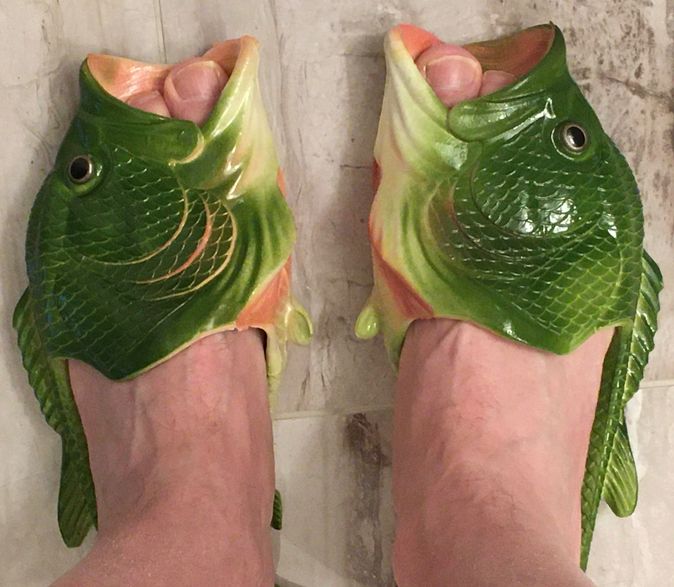
HANG A LEFT AT SHANKSVILLE!
For an extra dose of inspiration and knowledge, please take a peek at our latest blog post:
BlackmanLeftAtShanksville
And of course, you're welcome to become a blog subscriber too!
Coffee Break for the Mind is a registered trademark of Blackman & Associates, LLC
To make a Coffee Break for the Mind submission when you see or hear something funny, quirky or offbeat, please send it to: [email protected]
Looking for the ideal gift for yourself or others—to finish 2021 strong with dramatic growth and success, then please head to Amazon for the 5th edition of the bestselling:
Peak Your Profits:
BlackmanPeakYourProfits5

“You can't buy happiness, but you can buy books—and that's kind of the same thing!”
- Unknown
Thanks to Rainer Borgmann, CEO of Spudnik, who made Peak Your Profits a travel companion! In June, had the privilege to work with Rainer's terrific team and talented dealers at Spudnik's sales conference in Blackfoot, Idaho. Last weekend, Rainer sent me this pic, of PYP5 taking a reading break on his lanai.
Thanks to each you, who forward The Results Report to your teammates, peers, friends, family, customers and connections. With each issue, this literally happens thousands of times. And we're grateful. If you'd like to save a step, please send us the email addresses of those special folks you forward it to, as well as others you think would enjoy each issue. Then we'll add 'em to our virtual family. Plus, let them know it was your idea. Thanks!
|
| |
|
|
| |
|
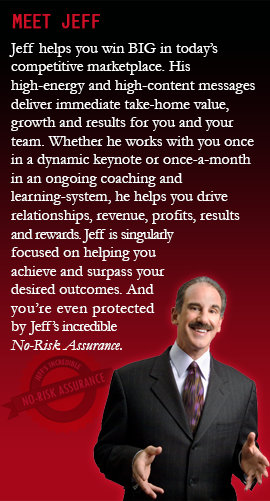 |
| |
 |
| |
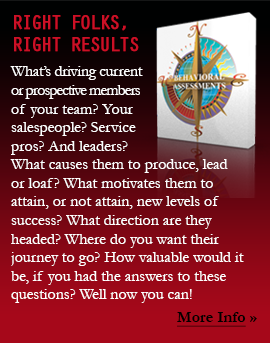 |
| |
 |
| |
| |
| |
 |
| |
|
"Jeff, the feedback is the best I've received in 9 years of coordinating our Forward meetings. You scored a Grand Slam! Thank you for doing such a great job, in preparing and motivating our team."
David Wallach • President
Barclay Street Real Estate
"At DUKAL we have an experienced team, exposed for many years to individuals and speakers who can help us. Yet when Jeff Blackman spoke, (a half-day results-session with reinforcement), I received comments like, 'Awesome!' 'Highly impactful!' 'Learned things I never knew, even after 25 years of selling.' 'I'll now take a different direction on how I present our value and work with customers.' and much more. Jeff's attention-to-detail and fact-gathering, made him better prepared in learning about our culture and team—than any previous speaker. And it showed! I highly recommend Jeff as an impact-player who can make any individual or company better!"
Gerry LoDuca • President
DUKAL Corp.
"From the moment we met Jeff, he was interested in knowing our business at a fundamental level. He spent multiple sessions with our team, learning our merger challenges, interviewing customers and suppliers, and tailoring his 'change' message. He then set our conference tone with a fantastic kick-off. I highly recommend Jeff to anyone looking to launch a new initiative or jump-start their organization wiht new energy and direction. We value his hard work and preparation and were thrilled with his presentation."
Paul Dean • Executive Vice President
LBM Advantage
Please click the following link, to see a
video testimonial from CEO-Chris Randall,
of Ultra Risk Advisors:
|
| |
|
|
|
|
|
| |
|
| |
|
|
| |
|
|
| |
|
|
| |
|
|
|
|
|
|
|
|